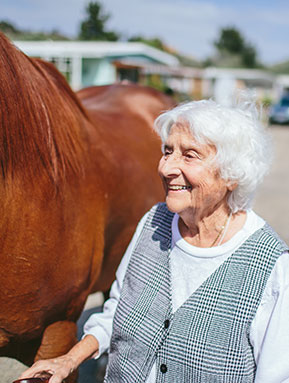While participating in Equine based activities, seniors and individuals with special needs may benefit from the following;
1. Increased social interaction.
2. Confidence enhancement.
3. Increased mobility.
4. Personal empowerment.
5. Hand-eye coordination.
6. A sense of accomplishment.
7. An opportunity to reflect on events of the past and present.
A recent study by Holly Dabelko-Schoney, associate professor of social work at Ohio State University, described an Equine Therapy Program in which Alzheimer’s patients fed, walked, painted and groomed horses four times a month. She noted that the experience lifted their mood, and there were fewer incidences of negative behavior.
An article elaborating on this study (AgingCare.com, 5/8/14) further stated the following:
”As the Ohio State Study demonstrates, these interventions could potentially have major positive implications for seniors and their caregivers. After the older adults interacted with the horses, mouth swabs were used to determine the amount of cortisol (a stress hormone) in the senior’s saliva and a modified version of the nursing Home Behavior Problem Scale - a test commonly used to monitor behavioral issues in people living in long term care settings - was used to measure their emotional response.
Across the board, those seniors who interacted with the horses scored better on the behavior scale than those who participated in the normal activities at the adult day care center.
Even if the effects didn’t last long, researchers were heartened by the possibility of equine therapy leading to true enhancement of the lives of people with Alzheimer’s. As Dabelko-Schoney says,’Our focus is on the ‘now’. What can we do to make them feel better and enjoy themselves right now? Even if they don’t remember it later, how can we help in this moment?’”


